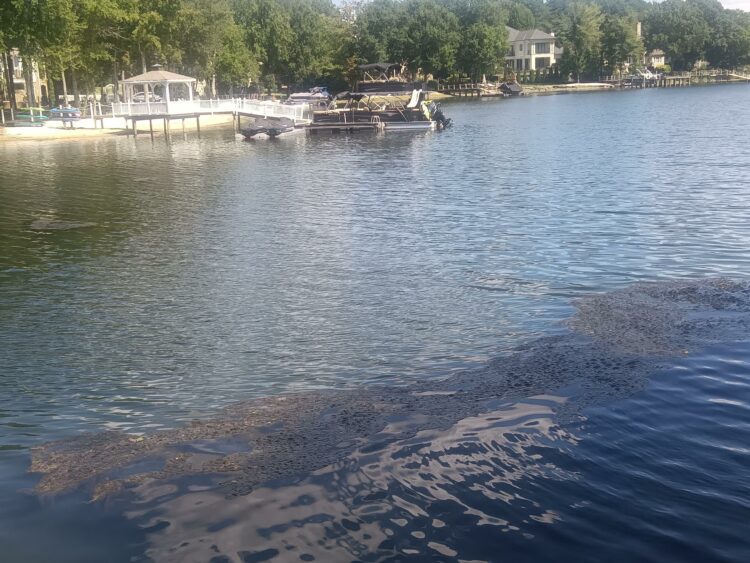
Lyngbya in lake adjacent to the 18th hole at The Peninsula Club
Jan. 31. By Dave Yochum. Funding for the battle against Lyngbya must be in place by April 1 to stem the fast-rising tide of noxious blue-green algae in Lake Norman, local officials and concerned citizens say.
From 2022 to 2023 Lyngbya doubled in Lake Norman, with dense mats—sometimes called sludge—evident in coves around Cornelius, more so on the south side of The Peninsula.
The issue is serious enough for NC Speaker of the House Tim Moore to attend a community meeting last night that drew about 200 people to The Peninsula Club, including Mayor Pro Tem Scott Higgins, Lake Norman Marine Commission member Rick Howard, former NC Sen. Jeff Tarte and Mayor Woody Washam.
Pricetag
Meeting organizers Bob Menzel and Bob Watson said the cost to chemically address the problem now is only about $60,000, but the price tag will soar because the bloom appears to double every summer. Treatment must occur in the spring, prior to the bloom.
There’s already about $15,000 pledged, they said.
Toxins
In addition to ruining the aesthetics of the lake experience, Lyngbya can produce toxins that cause rashes; dogs should not touch it, according to the Lake Norman Marine Commission. It can also affect drinking water if it invades Charlotte Water intake areas—the lake is the primary source of our drinking water.
Background
State funding was nearly in place—it was approved by the NC House last year—but didn’t make it through the Senate by the time the Legislature closed the session Oct. 25.
Speaker Moore, who is running for the newly configured 14th Congressional District, said he expects the NC Senate to approve funding soon after the session starts this spring—after the effective period during which dormant Lyngbya can be treated. Long-term treatment beyond the quick fix in April is expected over the course of four years.
The annual cost on Lake Gaston, which has a far more serious Lyngbya problem, began at around $700,000 and escalated to $1.3 million—paid for by surrounding government entities in North Carolina and Virginia.
—During treatment, Duke Energy scientists say the water is safe to swim in.
Next steps
The good thing here, is that the Lyngbya problem here was caught in the very early stages.
The preliminary fix needs to take place in April. If it doesn’t happen, it will occur next year at a far higher cost.
The Town of Cornelius statutorily cannot fund work on the lake—its jurisdiction is limited to policing lake waters.
Private funding will have to address the issue before state assistance kicks in.
To contribute, send checks to:
Mike Elliott/escrow account
Elliott Law Firm PA
PO Box 2021
Cornelius NC 28031
Businesses are invited to contribute as well.





